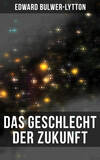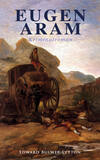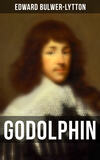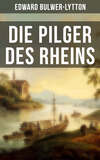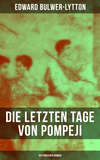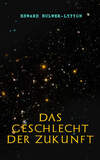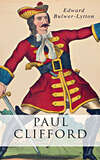Kitabı oku: «The Disowned — Complete», sayfa 11
CHAPTER XXIII
Cannot I create,
Cannot I form, cannot I fashion forth
Another world, another universe?
—KEATS.
The next morning Clarence, in his way out of town, directed his carriage (the last and not the least acceptable present from Talbot) to stop at Warner’s door. Although it was scarcely sunrise, the aged grandmother of the artist was stirring, and opened the door to the early visitor. Clarence passed her with a brief salutation, hurried up the narrow stairs, and found himself in the artist’s chamber. The windows were closed, and the air of the room was confined and hot. A few books, chiefly of history and poetry, stood in confused disorder upon some shelves opposite the window. Upon a table beneath them lay a flute, once the cherished recreation of the young painter, but now long neglected and disused; and, placed exactly opposite to Warner, so that his eyes might open upon his work, was the high-prized and already more than half-finished picture.
Clarence bent over the bed; the cheek of the artist rested upon his arm in an attitude unconsciously picturesque; the other arm was tossed over the coverlet, and Clarence was shocked to see how emaciated it had become. But ever and anon the lips of the sleeper moved restlessly, and words, low and inarticulate, broke out. Sometimes he started abruptly, and a bright but evanescent flush darted over his faded and hollow cheek; and once the fingers of the thin hand which lay upon the bed expanded and suddenly closed in a firm and almost painful grasp; it was then that for the first time the words of the artist became distinct.
“Ay, ay,” he said, “I have thee, I have thee at last. Long, very long thou hast burnt up my heart like fuel, and mocked me, and laughed at my idle efforts; but now, now, I have thee. Fame, Honour, Immortality, whatever thou art called, I have thee, and thou canst not escape; but it is almost too late!” And, as if wrung by some sudden pain, the sleeper turned heavily round, groaned audibly, and awoke.
“My friend,” said Clarence, soothingly, and taking his hand, “I have come to bid you farewell. I am just setting off for the Continent, but I could not leave England without once more seeing you. I have good news, too, for you.” And Clarence proceeded to repeat Talbot’s wish that Warner should bring the picture to his house on the following Thursday, that Sir Joshua might inspect it. He added also, in terms the flattery of which his friendship could not resist exaggerating, Talbot’s desire to become the purchaser of the picture.
“Yes,” said the artist, as his eye glanced delightedly over his labour; “yes, I believe when it is once seen there will be many candidates!”
“No doubt,” answered Clarence; “and for that reason you cannot blame Talbot for wishing to forestall all other competitors for the prize;” and then, continuing the encouraging nature of the conversation, Clarence enlarged upon the new hopes of his friend, besought him to take time, to spare his health, and not to injure both himself and his performance by over-anxiety and hurry. Clarence concluded by retailing Talbot’s assurance that in all cases and circumstances he (Talbot) considered himself pledged to be Warner’s supporter and friend.
With something of impatience, mingled with pleasure, the painter listened to all these details; nor was it to Linden’s zeal nor to Talbot’s generosity, but rather to the excess of his own merit, that he secretly attributed the brightening prospect offered him.
The indifference which Warner, though of a disposition naturally kind, evinced at parting with a friend who had always taken so strong an interest in his behalf, and whose tears at that moment contrasted forcibly enough with the apathetic coldness of his own farewell, was a remarkable instance how acute vividness on a single point will deaden feeling on all others. Occupied solely and burningly with one intense thought, which was to him love, friendship, health, peace, wealth, Warner could not excite feelings, languid and exhausted with many and fiery conflicts, to objects of minor interest, and perhaps he inwardly rejoiced that his musings and his study would henceforth be sacred even from friendship.
Deeply affected, for his nature was exceedingly unselfish, generous, and susceptible, Clarence tore himself away, placed in the grandmother’s hand a considerable portion of the sum he had received from Talbot, hurried into his carriage, and found himself on the high road to fortune, pleasure, distinction, and the Continent.
But while Clarence, despite of every advantage before him, hastened to a court of dissipation and pleasure, with feelings in which regretful affection for those he had left darkened his worldly hopes and mingled with the sanguine anticipations of youth, Warner, poor, low-born, wasted with sickness, destitute of friends, shut out by his temperament from the pleasures of his age, burned with hopes far less alloyed than those of Clarence, and found in them, for the sacrifice of all else, not only a recompense, but a triumph.
Thursday came. Warner had made one request to Talbot, which had with difficulty been granted: it was that he himself might unseen be the auditor of the great painter’s criticisms, and that Sir Joshua should be perfectly unaware of his presence. It had been granted with difficulty, because Talbot wished to spare Warner the pain of hearing remarks which he felt would be likely to fall far short of the sanguine self-elation of the young artist; and it had been granted because Talbot imagined that, even should this be the case, the pain would be more than counterbalanced by the salutary effect it might produce. Alas! vanity calculates but poorly upon the vanity of others! What a virtue we should distil from frailty; what a world of pain we should save our brethren, if we would suffer our own weakness to be the measure of theirs!
Thursday came: the painting was placed by the artist’s own hand in the most favourable light; a curtain, hung behind it, served as a screen for Warner, who, retiring to his hiding-place, surrendered his heart to delicious forebodings of the critic’s wonder and golden anticipations of the future destiny of his darling work. Not a fear dashed the full and smooth cup of his self-enjoyment. He had lain awake the whole of the night in restless and joyous impatience for the morrow. At daybreak he had started from his bed, he had unclosed his shutters, he had hung over his picture with a fondness greater, if possible, than he had ever known before! like a mother, he felt as if his own partiality was but a part of a universal tribute; and, as his aged relative, turning her dim eyes to the painting, and, in her innocent idolatry, rather of the artist than his work, praised and expatiated and foretold, his heart whispered, “If it wring this worship from ignorance, what will be the homage of science?”
He who first laid down the now hackneyed maxim that diffidence is the companion of genius knew very little of the workings of the human heart. True, there may have been a few such instances, and it is probable that in this maxim, as in most, the exception made the rule. But what could ever reconcile genius to its sufferings, its sacrifices, its fevered inquietudes, the intense labour which can alone produce what the shallow world deems the giant offspring of a momentary inspiration: what could ever reconcile it to these but the haughty and unquenchable consciousness of internal power; the hope which has the fulness of certainty that in proportion to the toil is the reward; the sanguine and impetuous anticipation of glory, which bursts the boundaries of time and space, and ranges immortality with a prophet’s rapture? Rob Genius of its confidence, of its lofty self-esteem, and you clip the wings of the eagle: you domesticate, it is true, the wanderer you could not hitherto comprehend, in the narrow bounds of your household affections; you abase and tame it more to the level of your ordinary judgments, but you take from it the power to soar; the hardihood which was content to brave the thundercloud and build its eyrie on the rock, for the proud triumph of rising above its kind, and contemplating with a nearer eye the majesty of heaven.
But if something of presumption is a part of the very essence of genius, in Warner it was doubly natural, for he was still in the heat and flush of a design, the defects of which he had not yet had the leisure to examine; and his talents, self-taught and self-modelled, had never received either the excitement of emulation or the chill of discouragement from the study of the masterpieces of his art.
The painter had not been long alone in his concealment before he heard steps; his heart beat violently, the door opened, and he saw, through a small hole which he had purposely made in the curtain, a man with a benevolent and prepossessing countenance, whom he instantly recognized as Sir Joshua Reynolds, enter the room, accompanied by Talbot. They walked up to the picture, the painter examined it closely, and in perfect silence. “Silence,” thought Warner, “is the best homage of admiration;” but he trembled with impatience to hear the admiration confirmed by words,—those words came too soon.
“It is the work of a clever man, certainly,” said Sir Joshua; “but” (terrible monosyllable) “of one utterly unskilled in the grand principles of his art—look here, and here, and here, for instance;” and the critic, perfectly unconscious of the torture he inflicted, proceeded to point out the errors of the work. Oh! the agony, the withering agony of that moment to the ambitious artist! In vain he endeavoured to bear up against the judgment,—in vain he endeavoured to persuade himself that it was the voice of envy which in those cold, measured, defining accents, fell like drops of poison upon his heart. He felt at once, and as if by a magical inspiration, the truth of the verdict; the scales of self-delusion fell from his eyes; by a hideous mockery, a kind of terrible pantomime, his goddess seemed at a word, a breath, transformed into a monster: life, which had been so lately concentrated into a single hope, seemed now, at once and forever, cramped, curdled, blistered into a single disappointment.
“But,” said Talbot, who had in vain attempted to arrest the criticisms of the painter (who, very deaf at all times, was, at that time in particular, engrossed by the self-satisfaction always enjoyed by one expatiating on his favourite topic),—“but,” said Talbot, in a louder voice, “you own there is great genius in the design?”
“Certainly, there is genius,” replied Sir Joshua, in a tone of calm and complacent good-nature; “but what is genius without culture? You say the artist is young, very young; let him take time: I do not say let him attempt a humbler walk; let him persevere in the lofty one he has chosen, but let him first retrace every step he has taken; let him devote days, months, years, to the most diligent study of the immortal masters of the divine art, before he attempts (to exhibit, at least) another historical picture. He has mistaken altogether the nature of invention: a fine invention is nothing more than a fine deviation from, or enlargement on, a fine model: imitation, if noble and general, insures the best hope of originality. Above all, let your young friend, if he can afford it, visit Italy.”
“He shall afford it,” said Talbot, kindly, “for he shall have whatever advantages I can procure him; but you see the picture is only half-completed: he could alter it!”
“He had better burn it!” replied the painter, with a gentle smile.
And Talbot, in benevolent despair, hurried his visitor out of the room. He soon returned to seek and console the artist, but the artist was gone; the despised, the fatal picture, the blessing and curse of so many anxious and wasted hours, had vanished also with its creator.
CHAPTER XXIV
What is this soul, then? Whence
Came it?—It does not seem my own, and I
Have no self-passion or identity!
Some fearful end must be—
......
There never lived a mortal man, who bent
His appetite beyond his natural sphere,
But starved and died.
—KEATS: Endymion.
On entering his home, Warner pushed aside, for the first time in his life with disrespect, his aged and kindly relation, who, as if in mockery of the unfortunate artist stood prepared to welcome and congratulate his return. Bearing his picture in his arms, he rushed upstairs, hurried into his room, and locked the door. Hastily he tore aside the cloth which had been drawn over the picture; hastily and tremblingly he placed it upon the frame accustomed to support it, and then, with a long, long, eager, searching, scrutinizing glance, he surveyed the once beloved mistress of his worship. Presumption, vanity, exaggerated self-esteem, are, in their punishment, supposed to excite ludicrous not sympathetic emotion; but there is an excess of feeling, produced by whatever cause it may be, into which, in spite of ourselves, we are forced to enter. Even fear, the most contemptible of the passions, becomes tragic the moment it becomes an agony.
“Well, well!” said Warner, at last, speaking very slowly, “it is over,—it was a pleasant dream,—but it is over,—I ought to be thankful for the lesson.” Then suddenly changing his mood and tone, he repeated, “Thankful! for what? that I am a wretch,—a wretch more utterly hopeless and miserable and abandoned than a man who freights with all his wealth, his children, his wife, the hoarded treasures and blessings of an existence, one ship, one frail, worthless ship, and, standing himself on the shore, sees it suddenly go down! Oh, was I not a fool,—a right noble fool,—a vain fool,—an arrogant fool,—a very essence and concentration of all things that make a fool, to believe such delicious marvels of myself! What, man!” (here his eye saw in the opposite glass his features, livid and haggard with disease, and the exhausting feelings which preyed within him)—“what, man! would nothing serve thee but to be a genius,—thee, whom Nature stamped with her curse! Dwarf-like and distorted, mean in stature and in lineament, thou wert, indeed, a glorious being to perpetuate grace and beauty, the majesties and dreams of art! Fame for thee, indeed—ha-ha! Glory—ha-ha! a place with Titian, Correggio, Raphael—ha—ha—ha! O, thrice modest, thrice-reasonable fool! But this vile daub; this disfigurement of canvas; this loathed and wretched monument of disgrace; this notable candidate for—ha—ha—immortality! this I have, at least, in my power.” And seizing the picture, he dashed it to the ground, and trampled it with his feet upon the dusty boards, till the moist colours presented nothing but one confused and dingy stain.
This sight seemed to recall him for a moment. He paused, lifted up the picture once more, and placed it on the table. “But,” he muttered, “might not this critic be envious? am I sure that he judged rightly—fairly? The greatest masters have looked askant and jealous at their pupils’ works. And then, how slow, how cold, how damned cold, how indifferently he spoke; why, the very art should have warmed him more. Could he have—No, no, no: it was true, it was! I felt the conviction thrill through me like a searing iron. Burn it—did he say—ay—burn it: it shall be done this instant.”
And, hastening to the door, he undid the bolt. He staggered back as he beheld his old and nearest surviving relative, the mother of his father, seated upon the ground beside the door, terrified by the exclamations she did not dare to interrupt. She rose slowly, and with difficulty as she saw him; and, throwing around him the withered arms which had nursed his infancy, exclaimed, “My child!—my poor—poor child! what has come to you of late? you, who were so gentle, so mild, so quiet,—you are no longer the same,—and oh, my son, how ill you look: your father looked so just before he died!”
“Ill!” said he, with a sort of fearful gayety, “ill—no: I never was so well; I have been in a dream till now; but I have woke at last. Why, it is true that I have been silent and shy, but I will be so no more. I will laugh, and talk, and walk, and make love, and drink wine, and be all that other men are. Oh, we will be so merry! But stay here, while I fetch a light.”
“A light, my child, for what?”
“For a funeral!” shouted Warner, and, rushing past her, he descended the stairs, and returned almost in an instant with a light.
Alarmed and terrified, the poor old woman had remained motionless and weeping violently. Her tears Warner did not seem to notice; he pushed her gently into the room, and began deliberately, and without uttering a syllable, to cut the picture into shreds.
“What are you about, my child?” cried the old woman “you are mad; it is your beautiful picture that you are destroying!”
Warner did not reply, but going to the hearth, piled together, with nice and scrupulous care, several pieces of paper, and stick, and matches, into a sort of pyre; then, placing the shreds of the picture upon it, he applied the light, and the whole was instantly in a blaze.
“Look, look!” cried he, in an hysterical tone, “how it burns and crackles and blazes! What master ever equalled it now?—no fault now in those colours,—no false tints in that light and shade! See how that flame darts up and soars!—that flame is my spirit! Look—is it not restless?—does it not aspire bravely?—why, all its brother flames are grovellers to it!—and now,—why don’t you look!—it falters—fades—droops—and—ha—ha—ha! poor idler, the fuel is consumed—and—it is darkness.”
As Warner uttered these words his eyes reeled; the room swam before him; the excitement of his feeble frame had reached its highest pitch; the disease of many weeks had attained its crisis; and, tottering back a few paces, he fell upon the floor, the victim of a delirious and raging fever.
But it was not thus that the young artist was to die. He was reserved for a death that, like his real nature, had in it more of gentleness and poetry. He recovered by slow degrees, and his mind, almost in spite of himself, returned to that profession from which it was impossible to divert the thoughts and musings of many years. Not that he resumed the pencil and the easel: on the contrary, he could not endure them in his sight; they appeared, to a mind festered and sore, like a memorial and monument of shame. But he nursed within him a strong and ardent desire to become a pilgrim to that beautiful land of which he had so often dreamed, and which the innocent destroyer of his peace had pointed out as the theatre of inspiration and the nursery of future fame.
The physicians who, at Talbot’s instigation, attended him, looked at his hectic cheek and consumptive frame, and readily flattered his desire; and Talbot, no less interested in Warner’s behalf on his own account than bound by his promise to Clarence, generously extended to the artist that bounty which is the most precious prerogative of the rich. Notwithstanding her extreme age, his grandmother insisted upon attending him: there is in the heart of woman so deep a well of love that no age can freeze it. They made the voyage: they reached the shore of the myrtle and the vine, and entered the Imperial City. The air of Rome seemed at first to operate favourably upon the health of the English artist. His strength appeared to increase, his spirit to expand; and though he had relapsed into more than his original silence and reserve, he resumed, with apparent energy, the labours of the easel: so that they who looked no deeper than the surface might have imagined the scar healed, and the real foundation of future excellence begun.
But while Warner most humbled himself before the gods of the pictured world; while the true principles of the mighty art opened in their fullest glory on his soul; precisely at this very moment shame and despondency were most bitter at his heart: and while the enthusiasm of the painter kindled, the ambition of the man despaired. But still he went on, transfusing into his canvas the grandeur and simplicity of the Italian school; still, though he felt palpably within him the creeping advance of the deadliest and surest enemy to fame, he pursued, with an unwearied ardour, the mechanical completion of his task; still, the morning found him bending before the easel, and the night brought to his solitary couch meditation rather than sleep. The fire, the irritability which he had evinced before his illness had vanished, and the original sweetness of his temper had returned; he uttered no complaint, he dwelt upon no anticipation of success; hope and regret seemed equally dead within him; and it was only when he caught the fond, glad eyes of his aged attendant that his own filled with tears, or that the serenity of his brow darkened into sadness.
This went on for some months; till one evening they found the painter by his window, seated opposite to an unfinished picture. The pencil was still in his hand; the quiet of settled thought was still upon his countenance; the soft breeze of a southern twilight waved the hair livingly from his forehead; the earliest star of a southern sky lent to his cheek something of that subdued lustre which, when touched by enthusiasm, it had been accustomed to wear; but these were only the mockeries of life: life itself was no more! He had died, reconciled, perhaps, to the loss of fame, in discovering that Art is to be loved for itself, and not for the rewards it may bestow upon the artist.
There are two tombs close to each other in the strangers’ burial-place at Rome: they cover those for whom life, unequally long, terminated in the same month. The one is of a woman, bowed with the burden of many years: the other darkens over the dust of the young artist.




